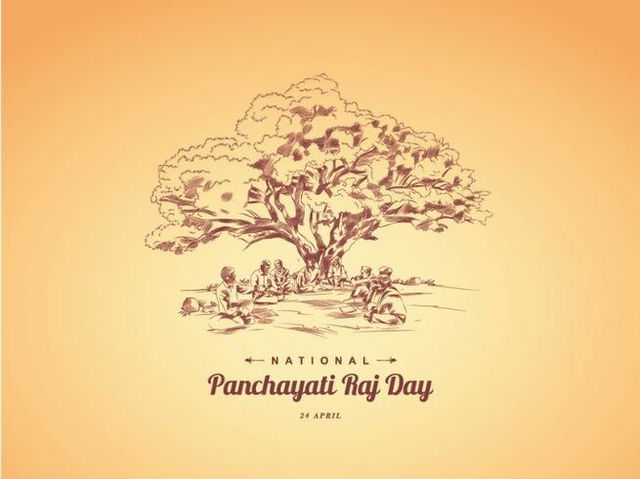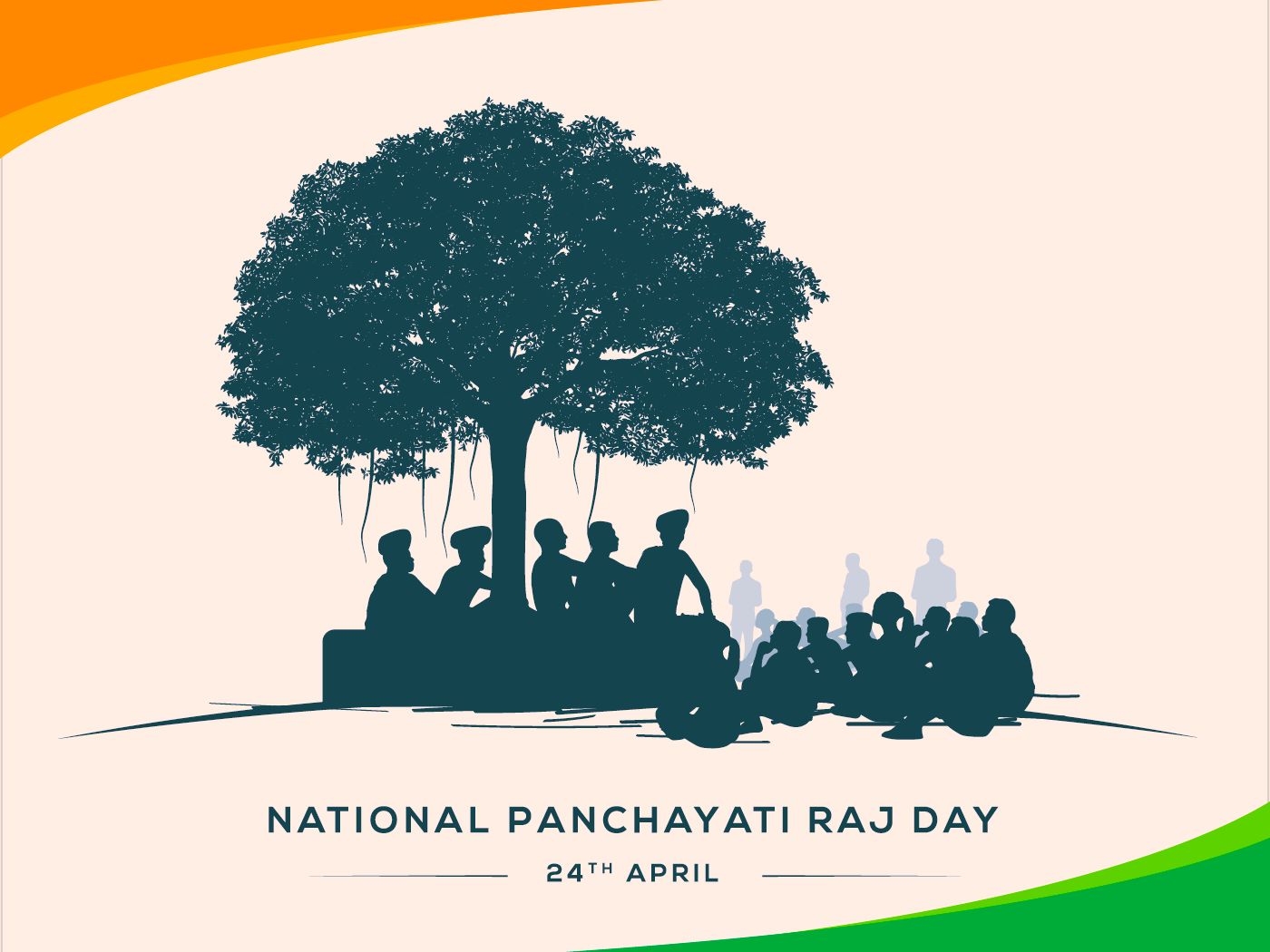- Calendar
- Calendar 2025
- April
- National Panchayati Raj Day
National Panchayati Raj Day
National Panchayati Raj Day is observed every year on 24 April in India, and it is also known as the National Local Self-Government Day.
This day is the beginning of the constitutional recognition of the Panchayati Raj System which was a decentralized pattern of governance that lets local organizations to make decisions for the welfare and development of rural areas.
The Panchayati Raj Department oversees the operations and growth of Panchayati Raj Institutions (PRIs) across India's states. Every state has its own department to manage local self-governance at the village, block, and district levels.

History of National Panchayati Raj Day: From Bill to Law
The 73rd Constitutional Amendment Act of 1993 is where the foundation of National Panchayati Raj Day originated. This act gave a constitutional status to the Panchayati Raj System.
This legislation was a milestone moment that intended to strengthen the democratic separation of powers and ensure better participation of people at the local level.
- Passage of the Bill: The 73rd Constitutional Amendment Bill was passed by the Lok Sabha on 22 December 1992 and by the Rajya Sabha on 23 December 1992.
- State Approval: Following its passage in Parliament, it was ratified by 17 state legislatures and received the President’s assent on 23 April 1993.
- Implementation: The Act came into effect on 24 April 1993, marking a new chapter in India’s governance system.
The amendment offered a firm regulatory structure for the establishment, composition, and functioning of Panchayati Raj Institutions, paving the way for democratic decentralization across India.
Establishment of National Panchayati Raj Day
The first National Panchayati Raj Day was celebrated on 24 April 2010.
It was officially declared by the then Prime Minister of India, Dr. Manmohan Singh, who emphasized the role of Panchayati Raj Institutions in countering socio-economic challenges and fostering development.
He pointed out that active participation of the local population in governance could address issues such as the Maoist threat by integrating marginalized communities into the development process.
The Panchayati Raj Act
The Panchayati Raj Act, formally known as the 73rd Constitutional Amendment Act of 1992, was introduced to empower and strengthen local self-governance in rural India. This act established a structured three-tier system of Panchayati Raj Institutions (PRIs) at the village, intermediate, and district levels.
Key Features of the Panchayati Raj Act
- The Gram Sabha consists of all adult members of a village and serves as the foundation of the system.
- Governance follows a three-tier structure at the village, intermediate, and district levels.
- Elections for Panchayati Raj Institutions (PRIs) are held every five years.
- Seats are reserved for Scheduled Castes (SCs), Scheduled Tribes (STs), and women to ensure representation.
- Panchayats have a tenure of five years, with provisions for early dissolution if required.
- The State Election Commission oversees and conducts PRI elections.
- States define the powers and functions of Panchayats.
- The Finance Commission reviews PRIs' financial status and provides resource allocation recommendations.
- The 11th Schedule outlines the powers, authority, and responsibilities of PRIs.
The Ministry of Panchayat
The Ministry of Panchayati Raj, a branch of the Government of India, is dedicated to promoting decentralization and strengthening local governance across the states. Established in May 2004, it operates under the leadership of a cabinet-ranked minister. Shri Rajiv Ranjan Singh, also known as Lalan Singh, currently holds this position.
Core Responsibilities
- Decentralization: Facilitating the division of powers and responsibilities among the Union, State, and Local Self Governments to enhance governance efficiency.
- Panchayati Raj Institutions (PRIs): Supervising the operations of PRIs at the village, block, and district levels.
- E-Governance: Advancing digital initiatives such as eGramSwaraj and Audit Online to improve transparency and accountability.
- Capacity Building: Empowering PRIs through training programs and various development schemes.
- Financial Oversight: Administering budgets and managing financial resources allocated to PRIs
The Digital Panchayat
The Digital Panchayat initiative, part of the Digital India Programme, focuses on enhancing the transparency, accountability, and efficiency of Panchayati Raj Institutions (PRIs).
Spearheaded by the Ministry of Panchayati Raj, the initiative includes the e-Panchayat Mission Mode Project (MMP), featuring the eGramSwaraj application.
This platform unifies various aspects of Panchayat operations, including planning, budgeting, accounting, monitoring, and asset management, into a single digital system.
Key features of the Digital Panchayat initiative:
- Online Payments: Enables seamless digital transactions for various services.
- eGramSwaraj: A task-oriented application designed for PRIs.
- Audit Online: Facilitates online auditing of Panchayat accounts, detailing internal and external audit records.
- Bharat Net Project: Seeks to provide broadband connectivity to all Gram Panchayats (GPs).
National Panchayati Raj Day Celebrations
National Panchayati Raj Day is celebrated across India with a range of events and initiatives aimed at promoting and strengthening local governance.
- The Ministry of Panchayati Raj honours outstanding Panchayats by presenting awards like the Panchayat Sashaktikaran Puraskar and the Nanaji Deshmukh Rashtriya Gaurav Gram Sabha Puraskar to recognize excellence in performance.
- Workshops and seminars are organized to provide training and facilitate discussions, helping elected representatives and officials enhance their skills.
- Additionally, elected Panchayat members have the opportunity to interact with national and state leaders, sharing their experiences and challenges to foster better understanding and collaboration.
Vision for the Future
On the occasion of National Panchayati Raj Day in 2015, Prime Minister Narendra Modi addressed elected representatives and emphasized eliminating the practice of undue influence by “sarpanch patis.” He called for genuine empowerment of women leaders and greater accountability in local governance.
Moving forward, the focus remains on:
- Strengthening financial autonomy of Panchayats.
- Promoting digital governance through e-Panchayat initiatives.
- Encouraging women and youth participation in local governance.
- Enhancing transparency and accountability in decision-making processes.
You might like to read these articles next:

Other Celebrations
-
Jan 16 Thu
-
Feb 28 Fri
-
Aug 03 Sun
-
Sep 26 Fri
-
Sep 27 Sat
-
Oct 18 Sat

National Panchayati Raj Day - Next years
Friday, 24 April 2026
Saturday, 24 April 2027
Monday, 24 April 2028











